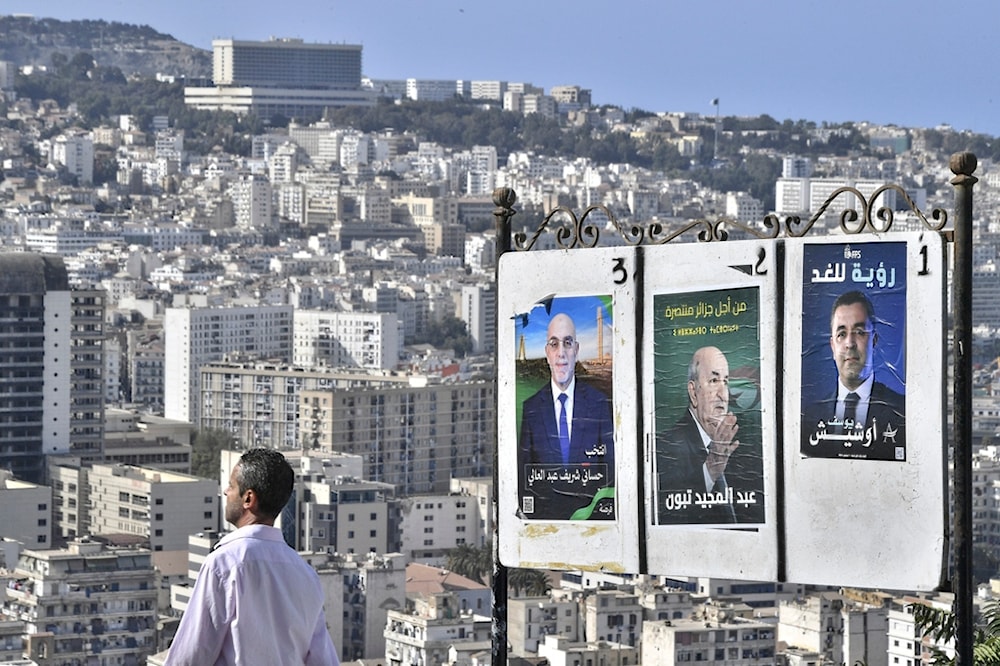Algerians head to polls to elect president as Tebboune eyes new term
Algeria’s electoral law stipulates that a candidate winning more than 51% of the vote can secure the presidency without the need for a second round.
-

A man walks past electoral banners of presidential candidates, including President Abdelmadjid Tebboune, center, Tuesday, Aug. 27, 2024, in Algiers, Algeria. (AP)
Algerians are heading to the polls on Saturday for a presidential election that is widely anticipated to see incumbent President Abdelmadjid Tebboune secure a second term.
This election features three candidates: Youcef Aouchiche, the Secretary General of the Front of Socialist Forces (FFS); independent candidate Tebboune; and Abdelaali Hassani, leader of the Movement of Society for Peace (MSP).
Polling stations opened at 8:00 am local time (0700 GMT) and will close at 7:00 pm.
Preliminary results may be released as early as Saturday night, with the Independent Electoral Authority (ANIE) required to officially announce the results by Sunday.
24,351,551 eligible voters
According to figures from ANIE, the electorate consists of 24,351,551 voters, with 23,486,601 within Algeria, of which 47% are women and 53% are men. Additionally, 36% of the voters are under 40 years old.
Algeria’s electoral law stipulates that a candidate winning more than 51% of the vote can secure the presidency without the need for a second round.
Tebboune, 78, is the clear frontrunner, expected to defeat moderate Islamist Hassani and socialist candidate Aouchiche in the contest to lead the North African nation.
One of the key challenges for Tebboune will be encouraging voter turnout, particularly after winning the 2019 election with 58% of the vote, amid a record abstention rate exceeding 60%.
The low turnout in 2019 followed the Hirak pro-democracy uprising, which led to the ousting of long-time president Abdelaziz Bouteflika, before being toned down by heavy policing.
With over half of the population being young, all candidates have focused their campaigns on this demographic, offering promises to improve living standards and reduce the country's dependence on hydrocarbons.
Tebboune has emphasized his economic achievements during his first term, including job creation and wage increases, in Africa’s largest natural gas exporter.
His challengers, however, have focused on expanding freedoms for Algerians.
Aouchiche, for example, has pledged "to release prisoners of conscience through an amnesty and to review unjust laws," in areas such as media and counter-terrorism.
Hassani has been vocal about restoring "freedoms that have been reduced to nothing in recent years."
Five years on from the Hirak movement, Amnesty International has claimed that Algerian authorities were "committed to maintaining a zero-tolerance approach towards dissenting opinions."
Voting for the Algerian community abroad, totaling 865,490 voters (45% women, 55% men), began Monday and is supervised by 117 commissions across various regions including Europe, the Arab world, Africa, Asia, and the Americas.
In Algeria’s southern regions, mobile polling stations for nomadic populations and remote areas began operations on Wednesday, covering 116,064 voters across 134 polling stations in 51 communes.
The presidential campaign, which ran from August 15 to September 3, was followed by three days of electoral silence, during which candidates were prohibited from any political activities.
Initially slated for December, the elections were moved forward due to what Tebboune described as "the current international situation and the dangers looming over Algeria."
Who are the candidates?
During his first term, Tebboune prioritized tackling corruption, recovering stolen assets, advancing economic reforms, and encouraging youth participation in politics. However, his tenure has also faced challenges, including inflation, food shortages, high unemployment, and ongoing crises in housing and water supply.
Hassani has long been involved in Algeria's political scene, having served as vice president of the People's National Assembly from 2007 to 2012. He is supported by various Islamist groups and independent religious figures.
Meanwhile, Aouchiche, the youngest candidate at 41, draws his support primarily from the Amazigh Kabylia region.
It is noteworthy that, of the more than 30 individuals who initially sought to challenge Tebboune, only Hassani and Aouchiche were approved to run. Several disqualified candidates faced fraud charges related to their paperwork, with three placed under judicial supervision.
These elections mark the seventh presidential vote in Algeria since the introduction of political pluralism in 1989. Prior to that, the country operated under a one-party system dominated by the National Liberation Front (FLN), dating back to its independence from France in 1962.
This will also be the second election held since the Hirak Movement began in 2019, with ANIE, established in the wake of Bouteflika's ousting, solely responsible for overseeing the electoral process, rather than Algeria’s interior ministry.
Read more: France-Algeria relations remain tense after decades of independence

 4 Min Read
4 Min Read








